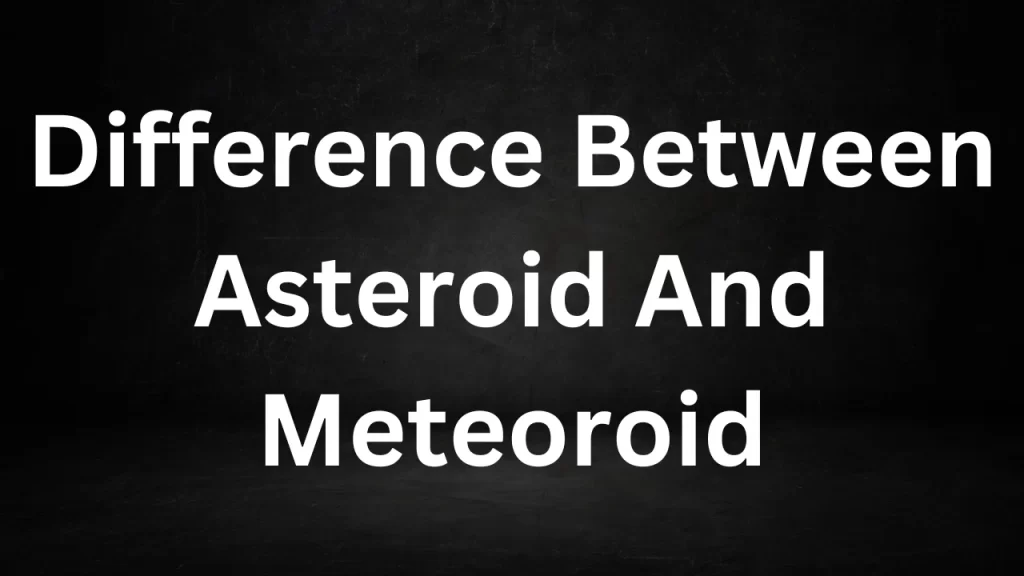Tag: Difference Between Asteroid And Meteoroid
Difference Between Asteroid And Meteoroid
Difference Between Asteroid And Meteoroid : Asteroids and meteoroids are celestial objects that inhabit our solar system, but they differ in several key aspects, including their size, location, and origin. Here’s a breakdown of the differences between asteroids and meteoroids:

Difference Between Asteroid And Meteoroid
1. Size:
- Asteroid: Asteroids are relatively larger celestial bodies. They can range in size from a few meters to hundreds of kilometers in diameter. Some of the largest asteroids are even classified as dwarf planets, such as Ceres.
- Meteoroid: Meteoroids are much smaller than asteroids. They can vary in size from a few millimeters to several meters in diameter. Meteoroids are typically significantly smaller than asteroids.
2. Location:
- Asteroid: Asteroids are primarily found in the asteroid belt, which is a region located between the orbits of Mars and Jupiter. However, asteroids can also be found elsewhere in the solar system, including near-Earth orbits.
- Meteoroid: Meteoroids can be found throughout the solar system. They are not confined to a specific region like the asteroid belt. Some meteoroids are part of asteroid families or are remnants of comets.
3. Composition:
- Asteroid: Asteroids are composed of various materials, including rock, metal, and sometimes even ice. Their composition can vary depending on their location and origin within the solar system.
- Meteoroid: Meteoroids can also have diverse compositions, but they are generally smaller and less massive than asteroids. Some meteoroids are composed of rock, while others may contain metal or other materials.
4. Origin:
- Asteroid: Asteroids are believed to be remnants from the early solar system’s formation, similar to planets. They are often considered leftover building blocks that never coalesced into full-fledged planets.
- Meteoroid: Meteoroids can have various origins. Some are fragments of asteroids or comets that have broken apart due to collisions or other forces. Others may be ejected material from the Moon or Mars.
5. Movement:
- Asteroid: Asteroids generally follow predictable orbits around the Sun. Their movements are influenced by gravitational forces, and they do not exhibit the rapid changes in brightness associated with meteoroids.
- Meteoroid: Meteoroids move through space at various speeds and trajectories. When they enter Earth’s atmosphere, they are often referred to as meteors or shooting stars. These meteoroids produce visible streaks of light due to their high-speed entry.
6. Visibility:
- Asteroid: Asteroids are not typically visible to the naked eye from Earth without the aid of telescopes. They remain distant and relatively stable in their orbits.
- Meteoroid: Meteoroids become visible when they enter Earth’s atmosphere and create bright streaks of light called meteors. If a meteoroid survives its journey through the atmosphere and reaches the Earth’s surface, it is referred to as a meteorite.
Read More
- Class 6 Maths Question Paper With Solutions NCERT PDF
- Sample Question Paper For Class 6 CBSE English Grammar
- NCERT Maths Book Class 6 Solutions PDF Free Download
Frequently Asked Question (FAQs) Difference Between Asteroid And Meteoroid
1. What is the main difference between asteroids and meteoroids?
The main difference between asteroids and meteoroids is their size. Asteroids are relatively larger celestial bodies, ranging from a few meters to hundreds of kilometers in diameter, while meteoroids are much smaller, typically measuring from a few millimeters to several meters.
2. Where are asteroids primarily located in the solar system?
Asteroids are primarily located in the asteroid belt, which is a region between the orbits of Mars and Jupiter. However, asteroids can also be found elsewhere in the solar system, including near-Earth orbits.
3. Do meteoroids have a specific location in the solar system like the asteroid belt?
No, meteoroids do not have a specific region in the solar system like the asteroid belt. They can be found throughout the solar system and are not confined to a particular area.
4. What are asteroids made of?
Asteroids are composed of various materials, including rock, metal, and sometimes ice. Their composition can vary depending on their location and origin within the solar system.
5. What materials are meteoroids typically composed of?
Meteoroids can have diverse compositions, but they are generally smaller and less massive than asteroids. Some meteoroids are composed of rock, while others may contain metal or other materials.